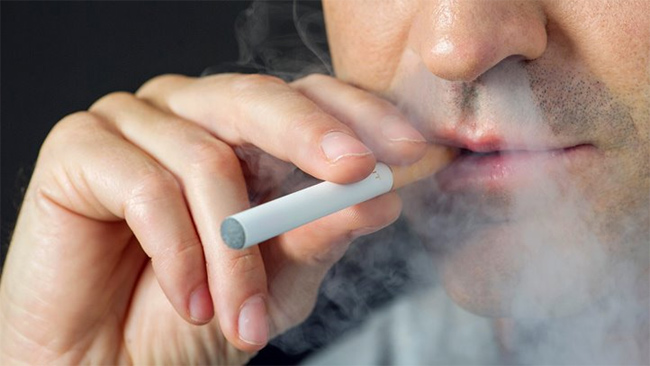Many people have turned to electronic cigarettes as a safer alternative to smoking or as a way to quit, but just how safe are e-cigarettes?
The use of electronic cigarettes, known as e-cigarettes or e-cigs, has become increasingly popular in recent years. ‘Vaping,’ as it is commonly called, has become so trendy that recent statistics indicate that there are over 7000 ‘vape’ shops in the U.S. These shops cater strictly to the users of e-cigarettes and other vaping devices. That number does not include the countless number of convenience stores and smoke shops that also carry e-cigarettes.
Originally these cigarette look-alikes were marketed as a safe alternative to real cigarettes and a means to quit or cut down on smoking. A nicotine liquid is heated electronically and turned to a vapor that is inhaled. Some e-cigarettes even have a little red LED light that gets brighter with each draw to mimic a lit cigarette. Competition between big tobacco companies, who quietly moved into the e-cig business, has become heated for the largest share of the market.
How Safe are Electronic Cigarettes?
While it is true that e-cigs deliver nicotine to the user in large quantities, the vapor does not contain tar, a leading carcinogenic in tobacco smoke or any of smoking’s other harmful chemicals. Therefore many medical experts maintain that vaping is a less harmful habit than cigarette smoking. Less harmful is in no way synonymous with safe.
A popular brand of e-cigarette called MarkTen is produced by Nu Mark which is owned by Altria, the parent company of tobacco giant Phillip Morris. Mark Ten, along with several other brands, carry large warning labels that extend beyond those of cigarette packs.
The Mark Ten warning label reads as follows:
“This product is not a smoking cessation product and has not been tested as such. This product is intended for use by persons of legal age and older, and not by children, women who are pregnant or breast feeding, or persons with or at risk of heart disease, high blood pressure, diabetes or taking medicine for depression of asthma. Nicotine is addictive and habit forming, and it is very toxic by inhalation, in contact with the skin, or if swallowed. Nicotine can increase your heart rate and blood pressure and cause dizziness, nausea and stomach pain. Inhalation of this product may aggravate existing respiratory conditions. Ingestion of the non-vaporized concentrated ingredients in the cartridges can be poisonous.”
In an interview with the NY Times, a spokesperson from Altria said that the longer labels on the new e-cigarette products are part of “a goal to openly and honestly communicate about heath effects,” based on previously developed tobacco product warnings.
Bill Phelps, a Nu Mark spokesperson said in an interview with the Washington Post that the company supports “the FDA developing a national warning’ for e-cigarette products and Nu Mark “in the absence of a government warning” looks to a “variety of sources” in order to develop its current warnings.
It may also be that big tobacco is using these warnings for protection against future lawsuits by persons who failed to quit smoking after using e-cigarettes, became addicted to nicotine or suffered one or more of several medical conditions associated with nicotine today or in the future.
In research published in the Journal of the American Heart Association, healthy non-smokers were found to have a biological marker known to increase the risk of heart disease after inhaling the nicotine vapors from only one e-cigarette. The research showed that nicotine alone is not harmless as many believed. It not only triggers addiction but also can adversely affect health in more than one way.
“There is this old saying that people smoke for the nicotine, because it’s so addictive, but they die from the tar.” Says study co-author Holly Middlekauff, a cardiologist at the University of California, Los, Angeles. This is the same belief that led to the nicotine therapies in the 1970’s, like nicotine patches and gums, to help people quit. Today e-cigarettes have become popular with cigarette smokers who view vaping as a less harmful addiction. Some cigarette smokers, however, use electronic cigarettes where smoking tobacco is not allowed, only return to smoking when they get home.
The use of e-cigarettes is relatively new and only time will reveal it’s long-term effects. Last year a study showed that electronic cigarettes produce 31 different harmful chemicals, two of which were carcinogens never found in e-cigarettes vapor prior to the study.
If the big tobacco companies are slapping giant warnings on e-cigs and the health risks are imminent, why would anyone want to take that gamble and continue to vape? There lies the ‘why’ of every addiction.
Vititoe Law Group is a personal injury law firm committed to the health and well being of everyone. If you have health issues caused by the use of any product or drug, contact Vititoe Law Group for a free consultation.








